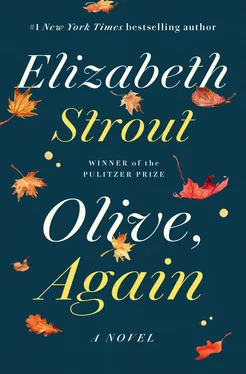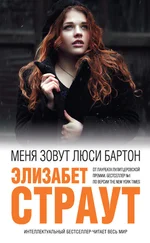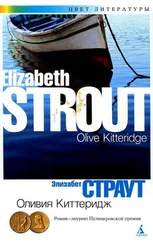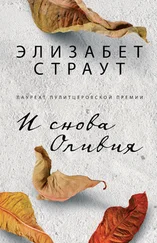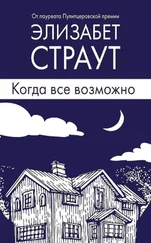Finally they went off to bed in the study and Olive sat with Christopher and Ann and the baby while Little Henry—such a good boy!—was asleep upstairs. Olive was getting used to the breast being stuck out in the open now, she didn’t like it, but she was getting used to it. And she felt sorry for Ann, who seemed to her to be diminished in her grief. So she made small talk with the woman and Ann seemed to try to do her best as well. Ann said, “Annabelle wanted those rubber boots because we were going to Maine. Isn’t that sweet?” And Olive, who could not think what to say about this, nodded. Ann eventually went upstairs with the baby, and then Olive was alone with Christopher, and she realized the moment had come.
“Christopher.” She forced herself to look at him, although he was looking down at his foot. “I’m getting married.”
It seemed forever before he looked at her and said, with half a smile, “Wait. What did you just say?”
“I said I’m getting married. To Jack Kennison.”
She saw the color leave his face; without a doubt his face became pale. He looked around the room for a moment, then turned to look at her. “Who the fuck is Jack Kennison?”
“He lost his wife a while ago. I’ve mentioned him on the phone to you, Chris.” She felt as though her face was flaming hot, as though all the blood that had drained from her son’s face had made its way to her face instead.
He looked at her with such genuine astonishment, she felt she would take it back immediately, the whole thing, if she could. “You’re getting married?” His voice was quiet now. In a quieter voice he said, “Mommy. You’re getting married?”
Olive nodded quickly. “I am, Chris.”
He kept shaking his head in small gestures, slowly, just kept shaking it and shaking it. “I don’t understand. I don’t get this, Mom. Why are you getting married?”
“Because we’re two lonely old people and we want to be together.”
“Then be together! But why get married? Mom?”
“Chris, what difference does it make?”
He leaned forward and said—his voice sounded almost menacing—“If it doesn’t make any difference, then why are you doing it?”
“I meant, to you. What difference does it make to you?” But horribly, Olive now felt a niggling of doubt. Why was she marrying Jack? What difference did it make?
Christopher said, “Mom, you invited us up here just to tell us that, didn’t you. I can’t believe it.”
“I invited you up here because I wanted to see you. I haven’t seen you since your father’s funeral.”
Christopher was looking at her hard. “You invited us up here to tell us you were getting married. Unfuckingbelievable.” Then he said, “Mom, you have never invited us up here.”
“I didn’t need to invite you, Chris. You’re my son. This is your home.”
And then the color returned to his face. “This is not my home,” he said, looking around. “Oh my God.” He shook his head slowly. “Oh my God.” He stood up. “That’s why it looks so different. You’re moving out. Are you going to move into his house? Of course you are. And sell this one? Oh my God, Mom.” He turned to look at her. “When are you getting married?”
“Soon,” she said.
“Is there going to be a wedding?”
“No wedding,” she said. “We’ll go to Town Hall.”
He walked to the stairs. “Good night,” he said.
“Chris!”
He turned.
Olive stood up. “Your language is deplorable. You said at your father’s funeral that the man never swore.”
Christopher stared at her. “Mom, you’re killing me,” he said.
“Well, Jack is coming over in the morning to meet you before you all leave.” She was suddenly furious. “Good night,” she said.
—
She could hear—almost immediately—Christopher and Ann talking; she could not hear what they said, she was sitting in the living room, but the sound of their voices came to her steadily. Finally she rose and slowly, very quietly, went and stood by the stairs. “Always been a narcissist, Chris, you know that.” And then Chris answered, “But Jesus Christ,” and something more, and Olive turned and went just as slowly and quietly back to her chair in the living room.
In her room later that night she kept thinking about the word “narcissist,” which she knew the meaning of naturally, but did she really know the meaning? She looked at her computer, finding the word “narcissism” in the dictionary. “Self-admiration,” it said, then, “personality disorder.” She closed the computer. Olive didn’t understand this, she really didn’t. Self-admiration? Olive felt no admiration of herself! Personality disorder? Given the extensive and widespread array of human emotions, why was anything a personality disorder? And who came up with such a term? People like that crackpot therapist Ann and Christopher had been seeing years ago in New York. Well, that therapist had a disorder; he was crazy.
She got into bed and she did not expect to sleep, and she did not sleep. She took from her bedside drawer the little transistor radio she had held on to while she slept—or tried to—for so many nights of her later life, and she turned it on low and held it to her ear, lying with it that way. The entire night went by and she stared at the dark, turning only a few times. She watched the red digital clock, and she clung to her little transistor radio, but she heard every word that came from it and understood that she had not even dozed.
When it was light she got up and got dressed and went downstairs. She put three bowls of Cheerios and the milk on the table. Glancing in the small mirror by the doorway she saw that she had the reddened-eye look of a prisoner.
“Hi, Mom,” said Christopher, appearing in the kitchen. “What time is he coming over? Because we have a long drive.”
“I’ll call him right now,” said Olive, and she did. “Hello, Jack,” she said, “can you come over now? They have a long drive and want to get started. Wonderful. See you soon.” She hung up.
“Oh, kids, look what Grandma did.” Ann came in holding the baby. “She got your cereal out.” The children did not look at her—Olive noticed—but sat down, Theodore and Annabelle balanced together on one chair, and ate their cereal. They made terrible smacking sounds. Little Henry put his spoon on the table and banged it hard, then smiled at Olive as milk and Cheerios sprayed through the air. “Henry,” murmured Ann. And Henry said, “Airplane!” And took the spoon and rode it through the air.
—
As soon as Olive saw Jack’s car pulling into the driveway she realized that Jack—of course—was driving his sports car, and she hoped Christopher didn’t see it. When Jack knocked on the door, and she let him in, she saw that he was wearing his suede coat, and she thought he looked rich, and sly. But he had the sense not to kiss her. “Jack,” she said. “Hello. Come and meet my son. And his wife,” she added. And then added, “And their kids.”
Jack gave a small bow in his ironical way, his eyes twinkling as they often did, and he followed her into the living room. “Hello, Christopher,” he said, and he held out his hand. Christopher rose slowly from his chair and said, “Hello.” He shook Jack’s hand as though it was a dead fish he had been offered.
“Oh, come on now, Chris.” The words were out of Olive’s mouth before she realized what she had done.
Christopher looked at her with open surprise. “Come on ?” He said this loudly. “Come on ? Jesus, Mom. What do you mean, ‘Oh, come on now, Chris’?”
“I just meant—” And Olive understood that she had been frightened of her son for years.
Читать дальше
